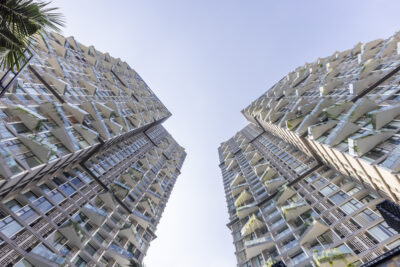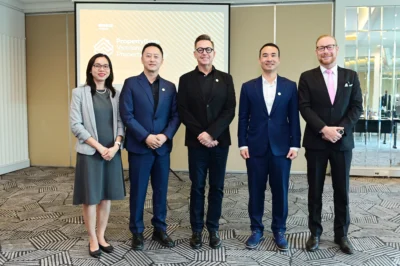The state of Asian real estate amidst the public health crisis
Industry leaders discuss the vital role of technology, as well as the impact of COVID-19 on both developers and consumers

The COVID-19 pandemic, which currently wreaks havoc across the world, has driven countless businesses and tourist destinations to close, has mandated 2.6 billion people (or a third of the global population) to observe lockdown protocols, has pushed 25 million individuals to the brink of unemployment and has led to global economic uncertainty.
Real estate is among the industries heavily affected by the outbreak. The construction of property developments are now delayed, on-site sales are prohibited or minimised, investors are more cautious, tenants operating non-essential businesses are facing financial issues and much much more.
So how is each sector doing?
Across the Asia Pacific, Invesco revealed that the logistics sector will be somewhat more resilient as they are backed by the growing B2C e-commerce activity. Companies will be more open to the use of widespread technology, but the supply chain will be obstructed because of the suspension of manufacturing processes and the rapid decline of road, rail and air traffic.
The pandemic will have minimal impact on the residential sector in Australia and Japan as opposed to other countries in the region. In Singapore, Hong Kong and China, consumers will delay household investments.
As for the retail sector, the founder of design brand YOO Worldwide John Hitchcox said that “technology has really changed the game” as its usage has been sped up by the lockdown. At the Asia Real Estate Reboot webinar last 30th of April, he said that they are getting around 400 Amazon deliveries per day in London because most of the population has now embraced online shopping.
“I think retail is going to become much, much more of an experience, which is where it was heading anyway and this is just going to accelerate the process,” he added.
Meanwhile, John said that offices, which has been operating based on the Live Work concept for 10 years or so, will be going through “a full demonstration of all the opportunities, and all of the advantages and disadvantages of [the concept] and I think that’s going to be much more acceptable.”
“We’ve all learned these words like Zoom, and how to conference and work, and we’ve definitely noticed it in our office. The level of productivity has been very good, if not better, than normal and in some cases, creativity seems to be good.”
However, that doesn’t mean the end for the office sector in the future. John said that there will be a need for offices since there are still employees who prefer to separate their home from their work. This time around though, employers will realise that it’s not always essential.
On the other hand, Bill Barnett, the managing director at C9 Hotelworks who was also a speaker at the Asia Real Estate Reboot, said that branded residences will be an exciting space. “Technology is certainly going to accelerate the space and I think when we look at transactions, be it COVID-19 related or something else, people will want a hands-off approach.”
“We think the entire transaction eventually with big data, will go online — and that’s certainly gonna be a big outcome from the outbreak.”
The accelerated use of technology will certainly help out this sector because by 2025, Bill revealed that 79 new branded residences projects, with more than 16,130 units in Asia in the upscale through luxury tiers will be added to inventory.
More: Hotel branded residences to emerge as Class A real estate in Asia
Developers turn to technology
Sharing the same sentiment as John and Bill in terms of the abrupt use of technology in the industry is Jeremy Williams, the chief business officer at Singapore proptech company PropertyGuru Group and one of the speakers at the Asia Real Estate Reboot.
He said that one of the key trends that the outbreak will encourage in Southeast Asia is the developers’ adoption of digital products. Most of PropertyGuru’s clients have already employed virtual solutions, such as sponsored digital content engagement, online launches, social media video posts, online booking, virtual tours and Zoom conferences.
For instance, he shared that the online launch of a small project in Singapore resulted in sales of 77 units over one weekend. “We don’t believe physical launches will go away, but we do see a world where developers will launch both digitally and physically simultaneously,” clarified Jeremy.
The proptech company has also introduced their own solutions to support developers, namely FastKey that automates project sales cycle from launch to close of sales; FastKey Storyteller, which is linked to a CRM and booking engine, that enables developers to create a digital show suite to allow remote viewings; virtual property shows and live stream sessions to connect Chinese agents with developers; and thought leadership webinars to educate developers with data, insights and market outlook.
More: Property developers in Singapore rely on technology to safely market projects
Shift in consumers’ buying behaviour
Unsurprisingly, property searches among consumers have declined amid the pandemic. Jeremy said that the number of inquiries they received across the market was varied, but the decline has stabilised a week after the announcement of the lockdown.
“We are currently seeing a week over week growth of about three percent in traffic and six percent in leads, which does indicate some strong underlying demand.”
The proptech company has also witnessed a 93 percent boost in consumer traffic for Southeast Asian properties coming out of China. Before the outbreak, the Chinese were very already active in the region’s property market. In Bangkok, for one, they represent up to 15 percent of primary or new home purchases.
“Given the search volumes we’re seeing, we do expect Chinese interest in Southeast Asia to increase from previous years,” shared Jeremy.
As property consumers get used to technology as they deal with life in isolation, developers must learn to take advantage of this and provide them with an immersive viewing experience from the comfort and safety of their homes.
The Asia Real Estate Reboot is a webinar organised by PropertyGuru Asia Real Estate Summit, in partnership with YOO Worldwide. A total of 691 participants from 37 countries participants across the world joined the one-hour web conference held last 30th of April. For further enquiries, email [email protected]. Visit the official website AsiaRealEstateSummit.com and follow our social media for upcoming live webinar announcements.
Recommended
Dewan Architects’ Mohammed Adib leads with human-centred design and technological innovation in the Middle East and beyond
Mohammed Adib channels his childhood curiosity and dislike for design uniformity into his work at Dewan Architects + Engineers
UAE real estate shifts focus to sustainability and quality, revitalising iconic projects
The UAE has risen from its challenges to emerge as a more sustainable, quality-focused destination
Exploring A Life By Design’s maximalist approach to interior design
Andrea Savage is embracing the maximalist trend with bold and vibrant interior designs
Jakarta’s emerging innovation hub integrates tech and healthcare sectors
The Digital Hub in BSD City is being positioned as Indonesia’s counterpart to Silicon Valley







